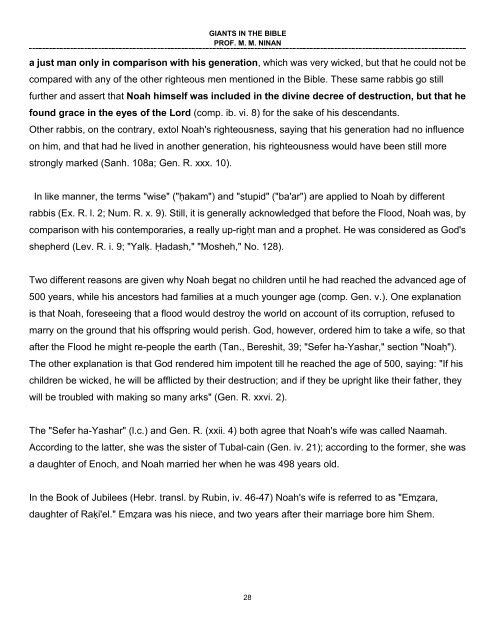Giants_in_the_Bible
Nephilims were on the earth, before and after the flood. Who are these giants? Were there other giant tribes and nations on the earth. How did they happen? A scriptural review on giants on earth.
Nephilims were on the earth, before and after the flood. Who are these giants? Were there other giant tribes and nations on the earth. How did they happen? A scriptural review on giants on earth.
Create successful ePaper yourself
Turn your PDF publications into a flip-book with our unique Google optimized e-Paper software.
GIANTS IN THE BIBLE<br />
PROF. M. M. NINAN<br />
a just man only <strong>in</strong> comparison with his generation, which was very wicked, but that he could not be<br />
compared with any of <strong>the</strong> o<strong>the</strong>r righteous men mentioned <strong>in</strong> <strong>the</strong> <strong>Bible</strong>. These same rabbis go still<br />
fur<strong>the</strong>r and assert that Noah himself was <strong>in</strong>cluded <strong>in</strong> <strong>the</strong> div<strong>in</strong>e decree of destruction, but that he<br />
found grace <strong>in</strong> <strong>the</strong> eyes of <strong>the</strong> Lord (comp. ib. vi. 8) for <strong>the</strong> sake of his descendants.<br />
O<strong>the</strong>r rabbis, on <strong>the</strong> contrary, extol Noah's righteousness, say<strong>in</strong>g that his generation had no <strong>in</strong>fluence<br />
on him, and that had he lived <strong>in</strong> ano<strong>the</strong>r generation, his righteousness would have been still more<br />
strongly marked (Sanh. 108a; Gen. R. xxx. 10).<br />
In like manner, <strong>the</strong> terms "wise" ("ḥakam") and "stupid" ("ba'ar") are applied to Noah by different<br />
rabbis (Ex. R. l. 2; Num. R. x. 9). Still, it is generally acknowledged that before <strong>the</strong> Flood, Noah was, by<br />
comparison with his contemporaries, a really up-rigḥt man and a prophet. He was considered as God's<br />
shepherd (Lev. R. i. 9; "Yalḳ. Ḥadash," "Mosheh," No. 128).<br />
Two different reasons are given why Noah begat no children until he had reached <strong>the</strong> advanced age of<br />
500 years, while his ancestors had families at a much younger age (comp. Gen. v.). One explanation<br />
is that Noah, foresee<strong>in</strong>g that a flood would destroy <strong>the</strong> world on account of its corruption, refused to<br />
marry on <strong>the</strong> ground that his offspr<strong>in</strong>g would perish. God, however, ordered him to take a wife, so that<br />
after <strong>the</strong> Flood he might re-people <strong>the</strong> earth (Tan., Bereshit, 39; "Sefer ha-Yashar," section "Noaḥ").<br />
The o<strong>the</strong>r explanation is that God rendered him impotent till he reached <strong>the</strong> age of 500, say<strong>in</strong>g: "If his<br />
children be wicked, he will be afflicted by <strong>the</strong>ir destruction; and if <strong>the</strong>y be upright like <strong>the</strong>ir fa<strong>the</strong>r, <strong>the</strong>y<br />
will be troubled with mak<strong>in</strong>g so many arks" (Gen. R. xxvi. 2).<br />
The "Sefer ha-Yashar" (l.c.) and Gen. R. (xxii. 4) both agree that Noah's wife was called Naamah.<br />
Accord<strong>in</strong>g to <strong>the</strong> latter, she was <strong>the</strong> sister of Tubal-ca<strong>in</strong> (Gen. iv. 21); accord<strong>in</strong>g to <strong>the</strong> former, she was<br />
a daughter of Enoch, and Noah married her when he was 498 years old.<br />
In <strong>the</strong> Book of Jubilees (Hebr. transl. by Rub<strong>in</strong>, iv. 46-47) Noah's wife is referred to as "Emẓara,<br />
daughter of Raḳi'el." Emẓara was his niece, and two years after <strong>the</strong>ir marriage bore him Shem.<br />
28

















